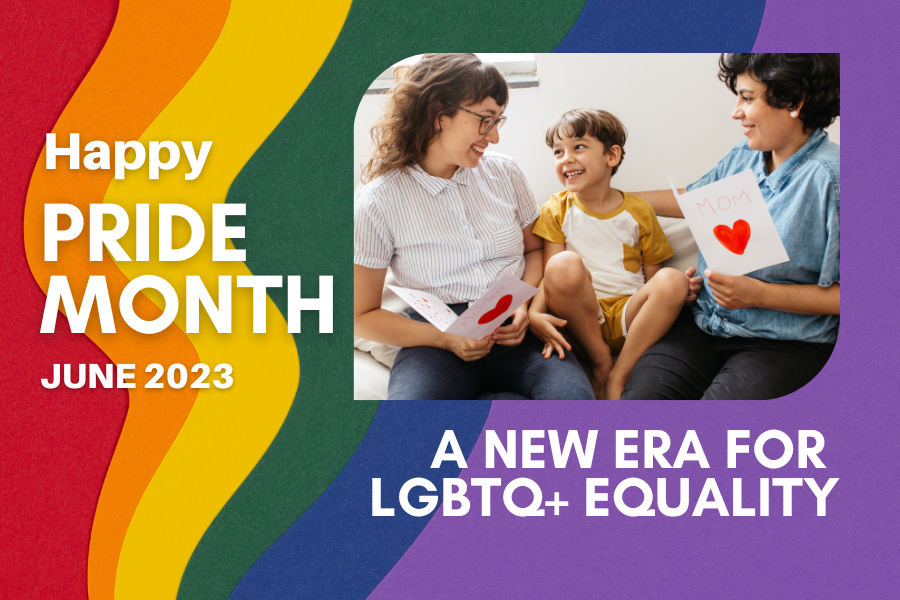For nearly 40 years, Hephzibah Children’s Association has played a pioneering role in the effort to build a foster-care system that supports and affirms LGBTQ+ caregivers and youth.
A New Era for LGBTQ+ Equality
By Susan Reich
In the decades that followed the lifting of the ban, Williams continued her advocacy. While serving on the board of the Oak Park Area Lesbian and Gay Association (OPALGA), she developed an independent two-day “Contemplating Parenthood” workshop for the local LGBTQ+ community.
“Foster parenting was just one of the topics that we covered in this workshop,” she notes. “We discussed the various routes to parenthood—from surrogacy and sperm donation to foster parenting and adoption. It was a way for individuals and couples to get the information they needed to make an informed decision about becoming a family.”
“Davida Williams has seen many changes in the foster-care system over the years and is responsible for many of the positive changes enjoyed by gay and lesbian families,” David Neubecker told a reporter for the Windy City Times in 2014. “Largely through Davida’s efforts and over decades of time, dozens of Hephzibah’s families have been headed by gay and lesbian couples. For many of them, it was Davida’s efforts that demystified the process and assured them that they had every right to pursue their dreams of forming forever families for these amazing children.”
By 2005—when Laura and Shelley Petrie, a River Forest couple in their thirties, approached Hephzibah about becoming foster parents—their sexual orientation was a non-issue.
“Shelley and I had been together for nine years and decided to try to start a family,” recalls Laura Petrie. “We had gone through multiple rounds of IVF, but it just wasn’t in the cards for us. So we called Davida. Within two weeks, we were enrolled in Hephzibah’s eight-week foster-parent training program. We’d completed seven of the eight weeks when we learned about a two-year-old boy that Hephzibah was trying to place. Three days after we completed our training, we met Danny and fell in love.”
A week later, they were parents. But, unlike biological parents, they didn’t have nine months to prepare for parenthood.
And Danny—like many children in foster care—had issues.
“Danny had been exposed to drugs prenatally,” explains Laura. “He was born addicted to crack cocaine and spent the first 28 days of his life in rehab. After that, he wasn’t fed regularly. his parents didn’t use a car seat and he fell out of a car window during a domestic dispute.”
Laura admits that the few months were rough.
“It was a hard transition,” she allows. “Danny didn’t sleep at night or nap during the day. He was restless and traumatized. We didn’t know what he liked to eat, and he didn’t talk or communicate very well. He’d pound on our chests to get our attention and then point or grunt. I still remember one night when Shelley and I had a pity party in the kitchen after he finally fell asleep. We were too exhausted to cook, so we had chicken nuggets for dinner and cried. Then we pulled it together and said, ‘We can do this.’”
Eventually, Laura, Shelley and Danny settled into a routine and life got better. Laura chuckles at the memory of those early days.
“In the beginning, Danny called everyone mom—the mailman, everyone at the grocery store and the waitresses at the restaurants we took him to. He didn’t say much else at first. We signed him up for speech therapy and continued to love him and work with him. Then, at the age of five, he started talking and didn’t stop! Once he became comfortable with us, he was very affectionate—and we couldn’t imagine life without him.”
When Danny began to struggle in middle school, the Petries reached out to Hephzibah once again for guidance and support.
“We hadn’t been in touch with Hephzibah for years and they not only took our call, but said, ‘How can we help?’ They connected us to the right people so that Danny could get the support that he needed.”
With this support, Danny went on to earn his high school degree. The Petries immediately shared the good news with Davida and the rest of the foster care team at Hephzibah.
“We wanted to let them know that there was a rainbow at the end of Danny’s story,” says Laura.
She pauses for a moment to reflect. “Hephzibah’s mission is to help children, and the staff there believes that a good parent is a good parent. It doesn’t matter if we are gay or straight or black or white or abled or disabled. Hephzibah is about love and about building families.”
Did the Petries bring anything special to foster parenting as a same-sex couple? Laura’s answer is characteristically down to earth.
“Honestly? I think we’re kind of boring. There’s no ‘special sauce’ that we brought to the table. We brought love and commitment and respect for one another. Danny is 19 now and attending community college. He’s healthy and happy, a good friend and a good neighbor. We’ve raised a good person who is a good citizen.
“Foster parenting is a lot of work, but I do believe that the rewards are greater than the sacrifices,” she continues. “It’s an incredible joy to bring a child in need into your home. We would do it again—100 times over. If more people took in foster children and gave them the love and support that they needed to become good citizens, we would have a much better world to live in.”
Upcoming Info Sessions

